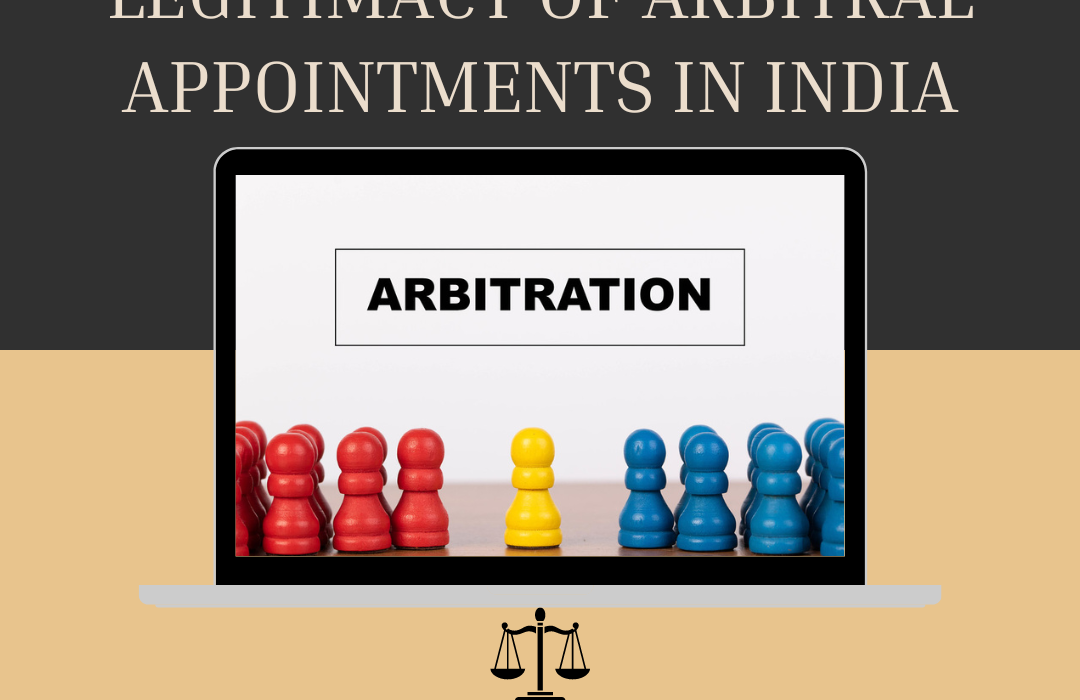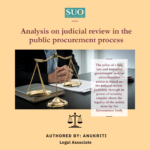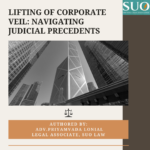LEGITIMACY OF ARBITRAL APPOINTMENTS IN INDIA
Independence and impartiality of arbitrators are the hallmarks of arbitration. The amendments to the Arbitration and Conciliation Act, 1996 in the year 2015, adopted the international best practices from the International Bar Association Guidelines on Conflict of Interest aimed to bolster not only the neutrality of arbitrators, but also the perception of neutrality.
Distinction between “ineligibility” and “justifiable doubts as to independence and impartiality”of an arbitrator:
It is pertinent to mention at the outset that, while the Fifth Schedule of the Arbitration and Conciliation Act, 1996 (read with Section 12(1)(a)) lists the various instances giving rise to ‘justifiable doubts as to the independence and impartiality’ of an arbitrator, the Seventh Schedule (read with Section 12(5)) relates to instances which directly result in the ‘ineligibility’ of a person from being appointed as an arbitrator unless the parties had expressly waived the applicability of the provision in writing after the agreement was entered into.
The Hon’ble Courts in India have distinguished between serving and past officials of an organization, relying on Entry 1 of the Seventh Schedule for the former and Entries 2, 5, 9 and 12 of the Fifth Schedule for the latter. While the former would be de jure ineligible [1], the latter would not [2]. The distinction is done considering former employees are seen as neither related to a party as employees, consultants or advisors, nor do they have any other past or present business relationship with the party, as required under Entry 1 of the Seventh Schedule[3]. This pertains to cases where technical expertise of such retired officials is sought, involving niche disputes. An appointment of a former employee may be subsequently challenged if certain situations arise, such as revelation of the involvement of the appointee with the project under dispute [4].
The Hon’ble Courts through various pronouncements have held that a balanced approach shall be adopted while interpreting Section 12 along with Schedules. Section 12(5) is a new provision which relates to the de jure inability of an arbitrator to act as such. Under this provision, any prior agreement to the contrary is wiped out by the non-obstante clause. The only way in which this ineligibility can be removed is by the proviso, which again is a special provision which states that parties may, subsequent to disputes having arisen between them, waive the applicability of Section 12(5) by an ‘express agreement in writing’.
Analysis of judicial pronouncements:
In the case, Aravalli Power Company Ltd. v Era Infra Engineering Ltd, (2017)15 SCC 32;the Hon’ble Supreme Court has reiterated the law by stating that, although prior to the Amendment Act the arbitrator being a current employee of any of the parties was ipso facto not a ground for disqualification, pursuant to the Amendment Act, such appointments would be illegal.
In the case, DBMGeotechnics & Constructions Pvt. Ltd. v Bharat Petroleum Corporation Ltd, 2017 SCC OnLine Bom 2401; the Hon’ble Bombay High Court had drawn a distinction between the power to nominate an arbitrator and the choice of the nominee. The arbitration clause allowed an employee of a company to nominate another employee as an arbitrator. The Court held that the power to nominate continued to remain valid even if statutory bars now meant that another employee could not be an arbitrator.
Another important aspect is whether an ineligible arbitrator can further validly nominate any other arbitrator?
The Hon’ble Supreme Court in the case TRFLtd v Energo Engineering Projects,(2017) 8 SCC 377; ruled out on the proposition in following words:
Para 57 “In such a context, the fulcrum of the controversy would be, can an ineligible arbitrator, like the Managing Director, nominate an arbitrator, who may be otherwise eligible and a respectable person. As stated earlier, we are neither concerned with the objectivity nor the individual respectability. We are only concerned with the authority or the power of the Managing Director. By our analysis, we are obligated to arrive at the conclusion that once the arbitrator has become ineligible by operation of law, he cannot nominate another as an arbitrator. The arbitrator becomes ineligible as per prescription contained in Section 12(5) of the Act. It is inconceivable in law that person who is statutorily ineligible can nominate a person. Needless to say, once the infrastructure collapses, the superstructure is bound to collapse. One cannot have a building without the plinth. Or to put it differently, once the identity of the Managing Director as the sole arbitrator is lost, the power to nominate someone else as an arbitrator is obliterated. Therefore, the view expressed by the High Court is not sustainable and we say so.”
Another issue that has been addressed vide this judgment is that the arbitration clauses are independent of each other, and irrespective of invalidity of one clause, another arbitration clause survives. Hence, in such matters the parties can get the appointment of arbitrator with the aid of court under Section 11 of the Arbitration & Conciliation Act.
In the case, HRD Corporation v GAIL, (2018) 12 SCC 471; the Hon’ble Supreme Court dealt with the appointment of former judges as arbitrators, who may be associated in previous disputes involving one or more parties to the arbitration. It was held that the arbitrator’s previous involvement in the case meant involvement in some other capacity and not as an arbitrator. Also, that previous involvement must be in the very dispute in arbitration where he is appointed as an arbitrator and not a different dispute/arbitration as any other interpretation would render Item 24 of the Fifth Schedule largely ineffective.
In another case, Bharat Broadband Network Limited v United Telecoms Limited,(2019) 5 SCC 755; it has been reiterated by the Hon’ble Supreme Court that when Managing Director of a company, one of the parties to the arbitration, was himself ineligible to act as arbitrator, such ineligible person could not appoint an arbitrator, and any such appointment would have to be held void.
In the case,Perkins Eastman Architects DPC v HSCC (India)Ltd, (2020) 20 SCC 760; the Hon’ble Supreme Court emphasised upon the importance of independence and impartiality of an arbitrator in a given dispute that can only be achieved when both parties can nominate respective arbitrators of their choice. Emphasis was laid on adopting a “counter balance” approach where both parties have equal rights to nominate an arbitrator.
A deviation to this approach is seen in the case, Central Organisation for Railway Electrification (CORE) v ECI-SPIC-SMO-MCML (JV), (2020) 14 SCC 712; wherein the Hon’ble Supreme Court has held that if the procedure has been laid down within the contract, the parties are bound by it and arbitrator(s) shall be appointed in strict adherence to the said procedure, while endorsing party autonomy. The Hon’ble Supreme Court, while interpreting the arbitration clause given under agreements stated that when the provision of appointment has been specifically provided, the appointment should be in terms of the agreement. The Courts have held that parties cannot not divert from the terms that have been mutually agreed between the parties.
In, Union of India v M/s. Tantia Constructions Ltd,(2021); SLP No. 12670/2020; a three judge bench of the Hon’ble Supreme Court disagreed the view taken in the abovementioned CORE judgement and referred the case to a larger bench in 2022. On 26 June 2023, the Hon’ble Supreme Court announced a new 5-Judge Bench that would hear this reference.On 12 July 2023, a Constitution Bench led by Hon’ble CJI Justice Chandrachud postponed all hearings related to the appointment of arbitrators by two months as an Expert Committee of the Union Government was in the process of examining the provisions of the Arbitration and Conciliation Act, 1996.On 17 January 2024, Attorney General R. Venkataramani informed the Bench that a draft report was ready and sought more time to review it. The Bench granted time till 16 April 2024. Further, they held that if nothing was finalised by then, they would proceed to hear the case on 23 April 2024. They also directed that the report be circulated to all parties of the case by mid-February 2024.
Conclusion:
In conclusion it is imperative to mention that, with the avid usage of extrinsic aids to interpretation e.g. the IBA Guidelines, 246th Indian Law Commission Report etc. and intrinsic aids like the headings in the Schedules, the Hon’ble Supreme Court sought to decipher the exact meaning and intention of the relevant entries in the Schedules and adopt a purposive interpretation of the provisions. However, this exercise was limited to the extent of the contentions raised and referred to by the parties. It is yet to be seen whether the Hon’ble Courts in India, and specifically the Hon’ble Supreme Court would continue to upkeep the spirit of these amendments, especially that of the Schedules, in the years to come.
References:
- West Haryana Highways Projects Pvt. Ltd. v National Highways Authority of India, (2017) 242 DLT 44.
- M/s. Voestalpine Schienen GMBH v Delhi Metro Rail Corporation Limited, (2017) 4 SCC 665.
- Reliance Infrastructure Ltd. v Haryana Power Generation Corporation Ltd Arbitration, Case No. 166 of 2016 (O&M), decided by Hon’ble High Court for the States of Punjab & Haryana on 27 October 2016.
- Afcons Infrastructure Ltd. v Rail Vikas Nigam Limited, 2017 SCC OnLine Del 8675.
Authored by: Adv. Somesh Pandey, Legal Associate, SUO Law Offices.




